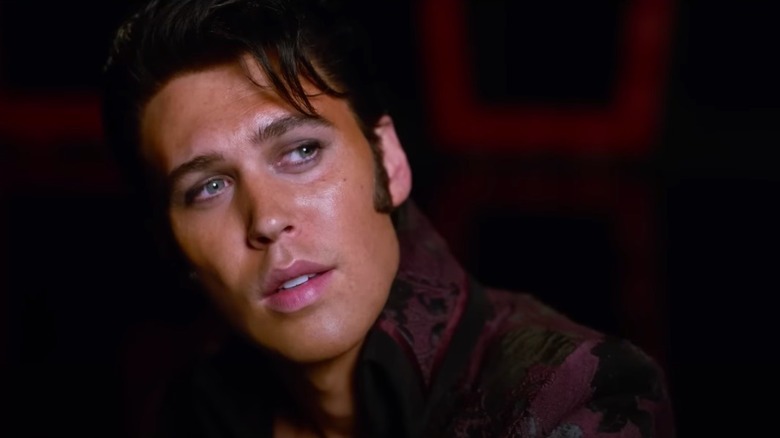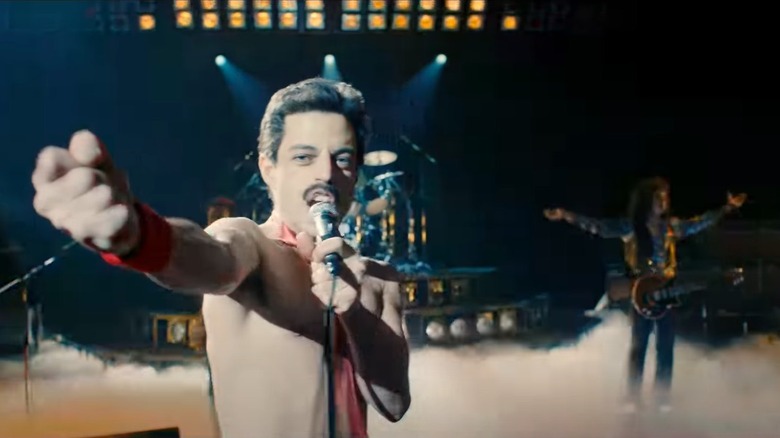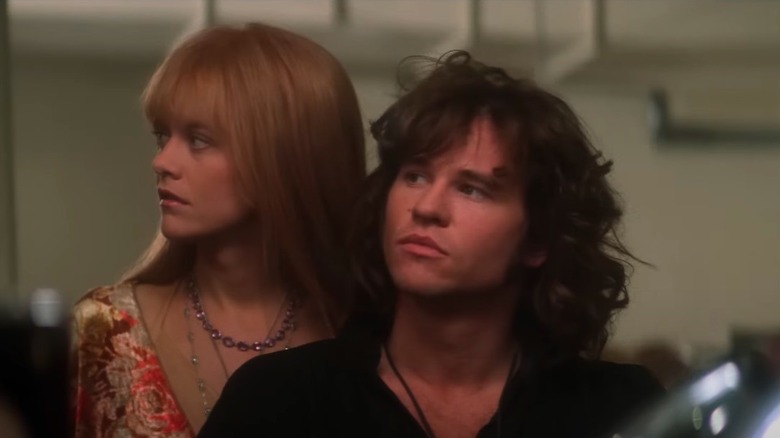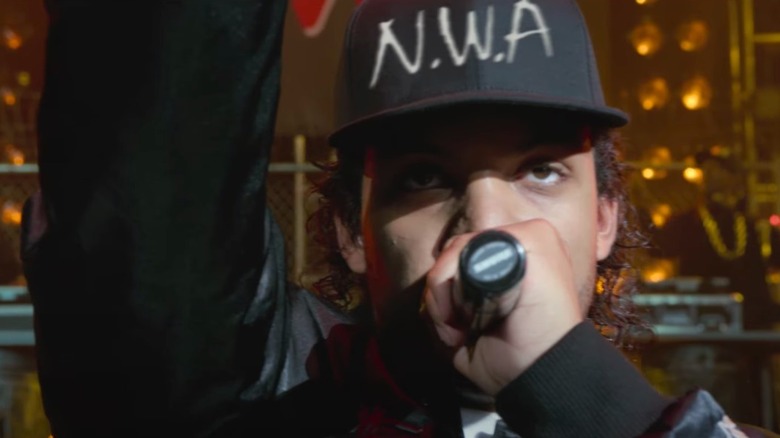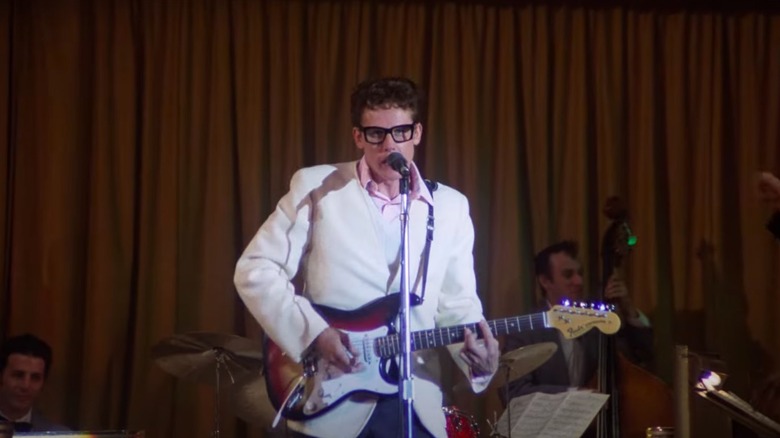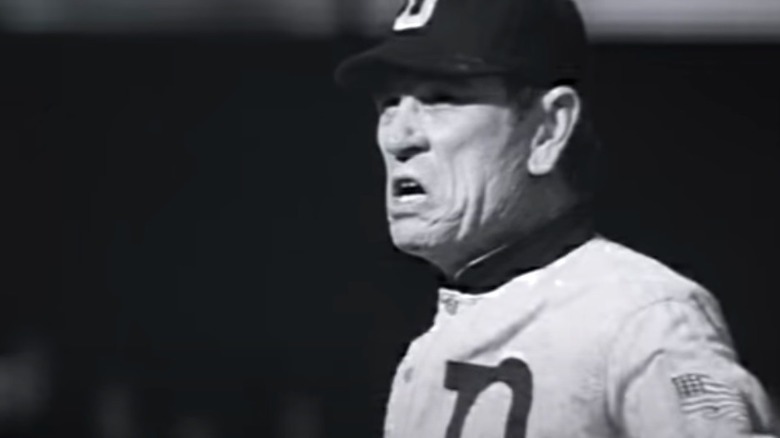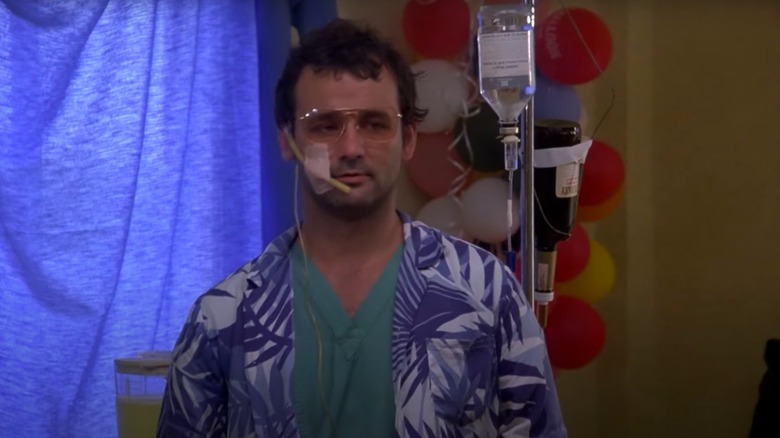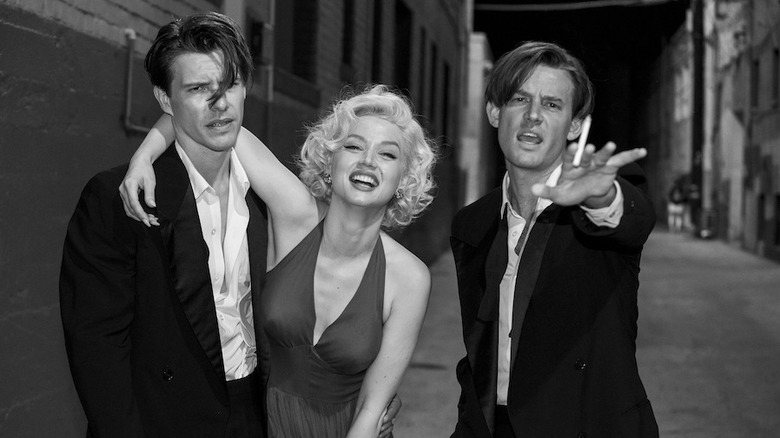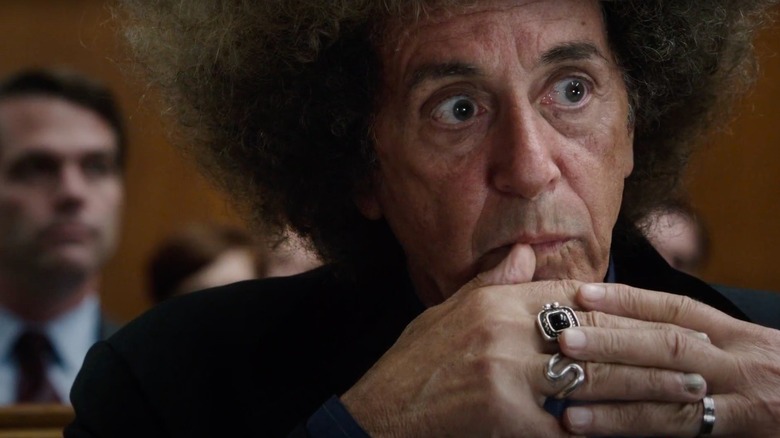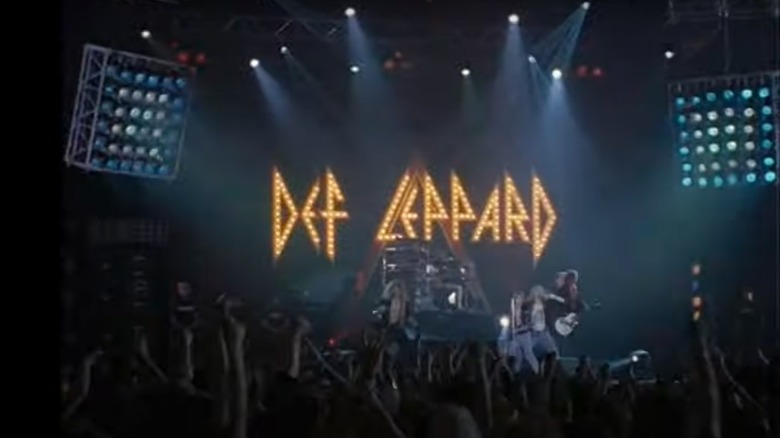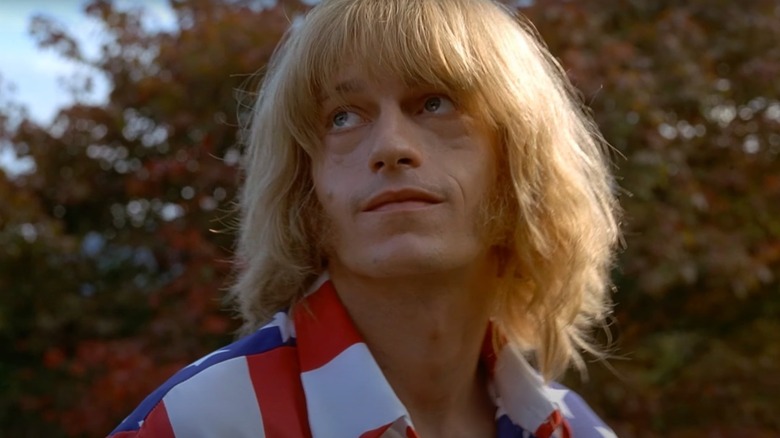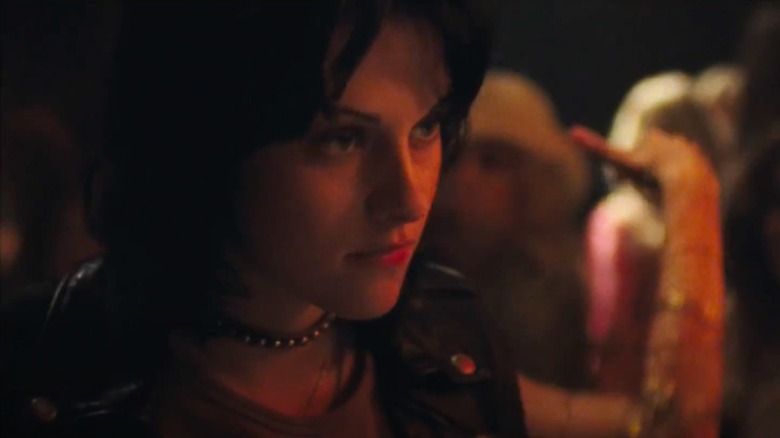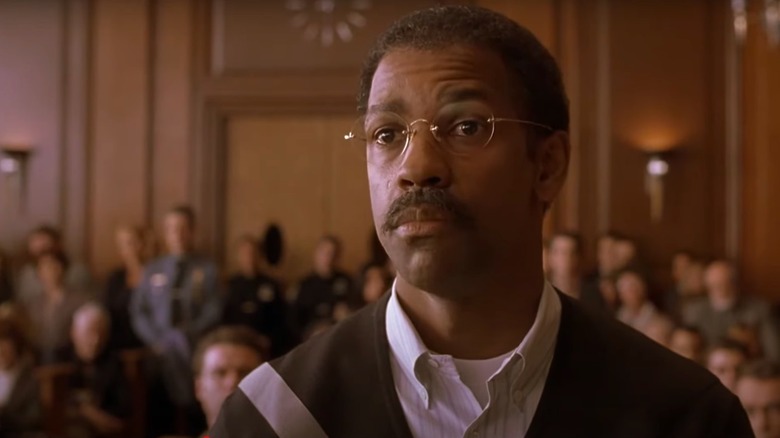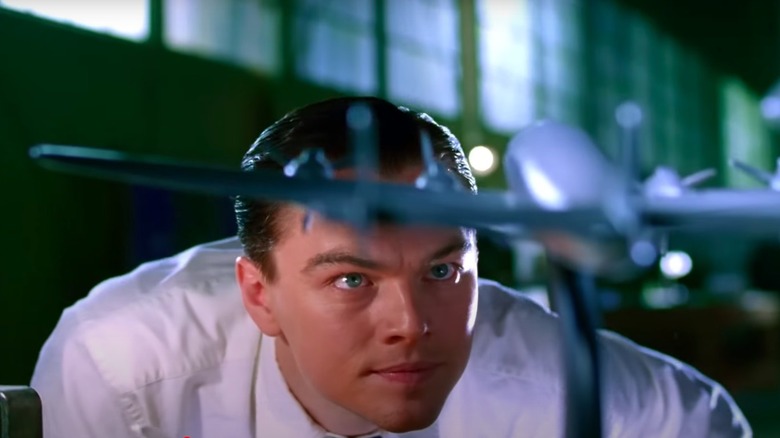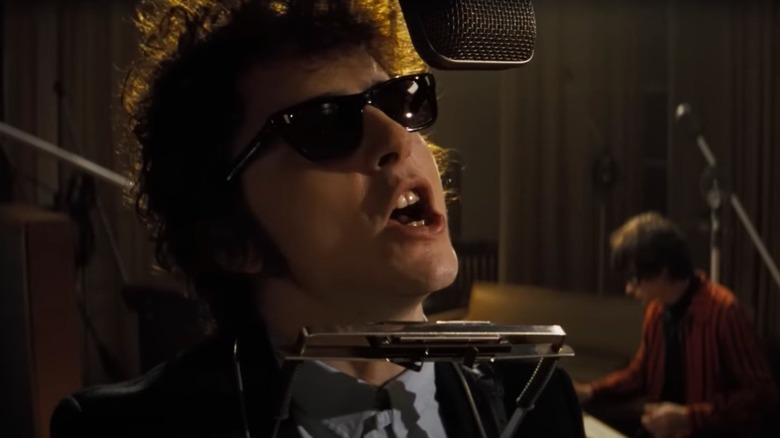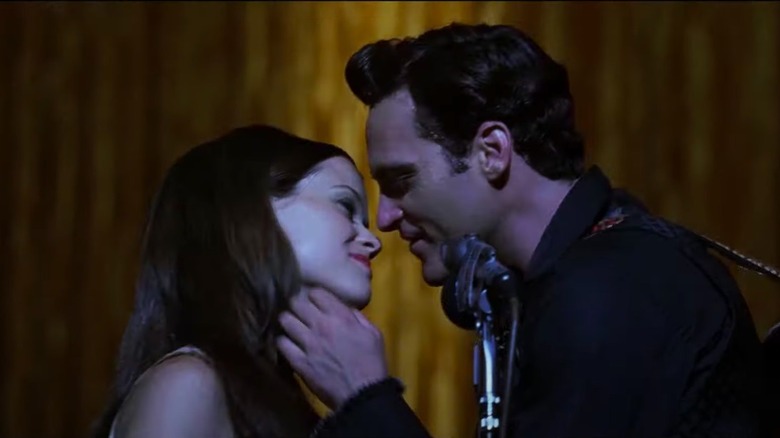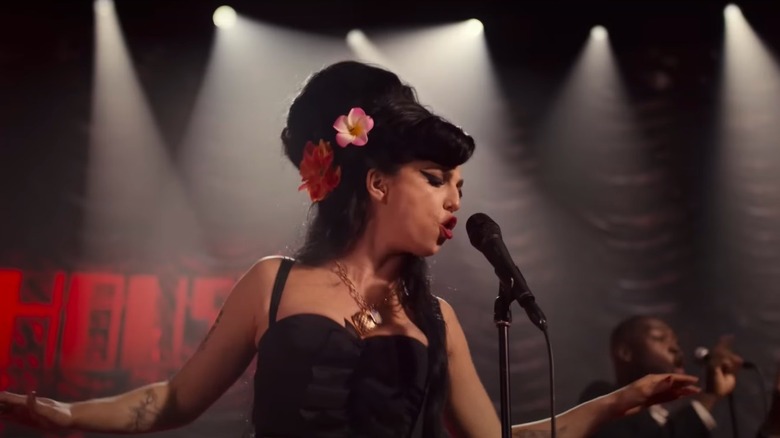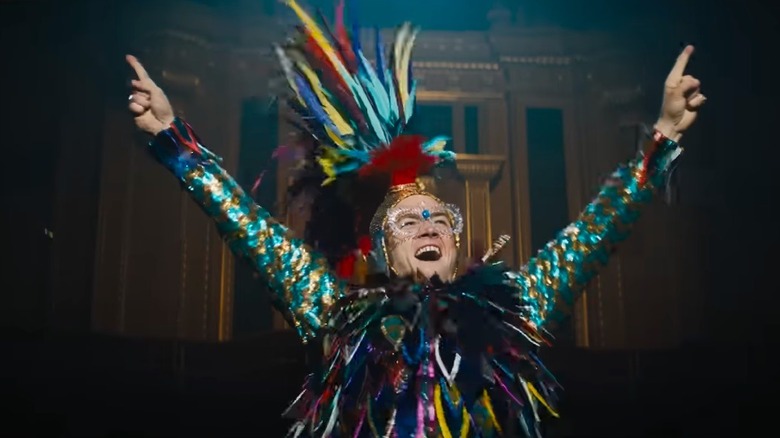Movies That Lied About The True Stories Of Legendary Celebrities
We may receive a commission on purchases made from links.
Biopics about famous folks have long enjoyed popularity with filmgoers, dating back to the earliest days of the medium. Way back in 1909, in fact, when "Birth of a Nation" director D.W. Griffith directed a seven-minute film focused on author Edgar Allan Poe, while other biopics from that era focused on the likes of Australian outlaw Ned Kelly, Russian novelist Alexander Pushkin, and British stage star Eleanor Gwynn.
The popularity of biopics has continued over the century-plus since then. In fact, rock stars have increasingly become the subjects of biographical movies in recent years, a lengthy list ranging from Bob Dylan ("A Complete Unknown") to Freddie Mercury ("Bohemian Rhapsody") to Elton John ("Rocketman"), and countless others.
That said, these Hollywood productions have often been known to skirt the truth to strengthen the story, and it's fair to say that even the most meticulously prepared biopics have dabbled in artistic licence in regards to facts. Sometimes these variations from accuracy are minor, other times downright egregious, but there have been plenty of movies that lied about the true stories of legendary celebrities.
Elvis
There's no denying that Baz Luhrmann's "Elvis" is a masterful work of filmmaking, borne out by eight Oscar nominations. As the definitive biopic of Elvis Presley, played to a tee by Austin Butler, "Elvis" centered on the relationship between the singer and his predatory manager, Colonel Tom Parker (portrayed by Tom Hanks, who's starred in several biopics over the years).
But how much of Luhrmann's story is actually true? It turns out that the director of "Romeo + Juliet" and "Moulin Rouge!," neither of which was faithful to history, did not break his artistic stride with "Elvis." For example, Luhrmann positions Parker and Presley atop a carnival Ferris wheel when they agree Parker will become his manager, which was entirely a Luhrmann invention. Then there's the science involving Presley's 1968 comeback TV special, which depicts a camera swinging around from a Christmas-staged set to a backdrop with "ELVIS" in lights so that Presley could hoodwink Parker, who insisted on a Christmas special. While that was a dramatic moment, Peter Guralnick's book, "Careless Love: The Unmaking of Elvis Presley," indicated Parker was well aware of what the singer had planned. And while the film sets the taping of the special on the same day as Robert F. Kennedy's assassination, his murder actually took place a few weeks earlier.
Perhaps the biggest lie in the movie is the scene in which Presley fires his manager while onstage in Vegas. "No, he never would have done that," Alanna Nash, author of several books about Presley, told USA Today.
The Dirt
The story of '80s hair metal band Mötley Crüe was told by the group's members themselves in the 2001 book "The Dirt," which formed the basis of a 2019 Netflix movie of the same name. While the film largely stays true to the book, it gets a few things wrong.
Chief among these is the fact that Vince Neil was not the band's original singer; that would be a guy named O'Dean Peterson, whose bad attitude led him to be tossed out of the band. Another has to do with a certain "Baywatch" star named Pamela Anderson, who met Mötley Crüe drummer Tommy Lee on New Year's Eve 1994 and married him a few days later. During the course of their tumultuous four-year marriage, the couple's tabloid-documented exploits received way more attention than anything Mötley Crüe did in the early 1990s, including their infamous leaked sex tape and Lee spending six months behind bars after she accused him of domestic assault.
Despite all of that being common knowledge, none of it warrants even the tiniest mention in "The Dirt." In fact, there's not one single reference to Anderson at any point in the film, raising questions about whether her lawyers may have made a preemptive strike to keep her out of it.
If you or someone you know is dealing with domestic abuse, you can call the National Domestic Violence Hotline at 1−800−799−7233. You can also find more information, resources, and support at their website.
Bohemian Rhapsody
One of the most acclaimed biopics in recent memory, "Bohemian Rhapsody" won four Oscars, including Rami Malek taking home the best actor honors for his portrayal of Queen frontman Freddie Mercury. Despite — or perhaps because — the film being made with the full cooperation of the surviving band members (Mercury's AIDS-related death occurred in 1991), "Bohemian Rhapsody" takes numerous liberties with the truth. For one, the timing is off on Mercury's HIV diagnosis: in the film, he learns the news prior to the band's iconic 1985 Live Aid performance, when the truth is that Mercury wasn't officially diagnosed until sometime in 1986 or '87.
Another big departure came with the film's depiction of the band splitting up after Mercury signed a solo deal. The truth was far less dramatic; by 1983, everyone had become so exhausted from the relentless schedule of recording and touring that they took a break, not a breakup.
Then there's record executive Ray Foster (played by Mike Myers), who refused to release "Bohemian Rhapsody" as a single because he didn't think it would be commercial enough. Foster is entirely fictional, as is the part when the band storms out of his office in disgust and hurls a rock through his window.
The Doors
Filmmaker Oliver Stone directed "The Doors," his eponymous 1991 biopic about the band behind such hits as "Light My Fire," and "Riders on the Storm." Despite the film's name, Stone's focus isn't the band itself, but doomed frontman Jim Morrison (played by late actor Val Kilmer), and particularly Morrison's relationship with girlfriend Pamela Courson (Meg Ryan).
While the film received mixed reviews, some of the harshest criticism came from Doors keyboardist Ray Manzarek, who slammed Stone for depicting Morrison as a far darker figure than he actually was. "The film portrays Jim as a violent, drunken fool. That wasn't Jim," Manzarek declared in a 1991 interview with the Los Angeles Times. "When I walked out of the movie, I thought, 'Geez, who was that jerk?' ... The film isn't based on love. It's based on madness and chaos."
Manzarek expressed similar gripes more than a decade later, when interviewed by journalist Steve Newton. "Uh, it was not an accurate depiction of the band or of Jim Morrison," Manzarek said, while conceding that Kilmer actually did a pretty solid job portraying Morrison, particularly given Stone's apparent agenda. "Decidedly over the top, and made Morrison seem like kind of a drunken weirdo — and he was much more intelligent, much more sensitive, much more spiritual than that drunken lout in the movie."
Straight Outta Compton
The origin story of trailblazing LA rap group N.W.A. forms the basis of 2015's "Straight Outta Compton," the members of which included Dr. Dre, Ice Cube, and Eazy-E. One notorious incident from the group's early years involved Dre, when he violently assaulted female journalist Dee Barnes in 1991. The rapper was charged and entered a plea of no contest; he avoided jail time and was instead sentenced to two years' probation
While that incident would seem to be a central part of N.W.A.'s history, it is entirely absent in "Straight Outta Compton." In a since-deleted post in Gawker (via the Los Angeles Times), Barnes criticized the film for its "revisionist history," and wrote, "I didn't want to see a depiction of me getting beat up. But what should have been addressed is that it occurred."
In a Q&A coinciding with a screening, director F. Gary Gray was questioned by an audience member about why Dre's assault wasn't included in the movie. Gray, however, insisted the intent wasn't to omit the incident, but noted that the first draft of the screenplay was 150 pages and cuts needed to be made. Dre's assault on Barnes was simply one of many parts that didn't make it into the movie. "There are so many things that you can add or subtract," said Gray. "Cube always said, 'You can make five different N.W.A movies.' We made the one we wanted to make."
The Buddy Holly Story
Arriving in theaters in 1978, "The Buddy Holly Story" chronicled the rise of Buddy Holly in the early days of rock 'n' roll until his tragic death in a 1959 plane crash, now known as the Day the Music Died. While Gary Busey earned an Oscar nomination for his performance as the late singer, the film was also criticized for containing numerous inaccuracies.
"I'm not highly impressed with the movie," Joe B. Mauldin, a member of Holly's backing band, told Rolling Stone. "It was presented as biography and it is a long way from that." Also miffed was Norman Petty, the producer and co-writer of such Holly hits as "That'll Be the Day," and "Peggy Sue," who doesn't appear in the movie at all, despite being an integral component in Holly's musical success. "But I was purposely left out of the movie," Petty said. "I felt like a nonentity, like some very important years of my life had just been wiped out."
In fact, the actual namesake of "Peggy Sue," Peggy Sue Gerrow Allison Rackham, heaped scorn on the amount of dramatic licence taken by the movie. Then wife of Crickets drummer Jerry Allison (who co-wrote the song with her in mind), she was very close with Holly and his wife, Maria Elena. "The movie's typical Hollywood, gobbledygook fantasy," Rackham said. "I had thought there would be more of a story than what there was ... and Jerry and Buddy were very close, closer than most brothers."
Cobb
During his heyday in the early part of the 20th century, Ty Cobb was a baseball superstar, and arguably the most hated player in the sport, notorious as one of the dirtiest players in baseball history. The athlete was portrayed by Tommy Lee Jones in the 1994 biopic "Cobb," depicted as a violent, hard-drinking racist. That characterization, however, has been widely disputed, and has its origins in a book by sportswriter Al Stump, "Cobb: The Life and Times of the Meanest Man Who Ever Played Baseball."
Stump had previously ghostwritten Cobb's memoir, "My Life in Baseball." However, Cobb was so displeased with Stump's error-ridden manuscript that he sent an angry letter to his publisher demanding Stump be removed from the project. The book was published shortly after his 1961 death, unaltered, and Stump's subsequent book formed the basis of "Cobb."
Another writer, William R. Cobb (no relation), embarked on a deep-dive investigation into Stump's claims about the baseball icon, discovering much of what Stump had written was provably false, based on forged documents he'd created, even faking an entire diary. He published his findings in a book, "The Georgia Peach: Stumped by the Storyteller," concluding in an article by the same name, published by the Society for American Baseball Research, that nearly all of the controversy about Cobb over the years had come from Stump's largely fabricated book. "These are the writings that are responsible for many, if not most, of the more outrageous — and mostly untrue — elements of the Cobb myth," William R. Cobb wrote.
Where the Buffalo Roam
Director Terry Gilliam achieved what had been thought to be impossible with his 1998 adaptation of legendary gonzo journalist Hunter S. Thompson's surrealistic masterpiece, "Fear and Loathing in Las Vegas," with Johnny Depp as Thompson. However, an earlier film about Thompson exists, the 1980 comedy "Where the Buffalo Roam," with Thompson played by Bill Murray.
Murray's wacky take on Thompson is enjoyable enough, but the film itself is riddled with inaccuracies. Most notable of these is that Thompson's friend, Mexican-American attorney Oscar Zeta Acosta, is played by non-Latino Peter Boyle, and renamed Carl Lazlo.
Interestingly, the lawyer character was initially named Mendoza, but that was changed when complaints arose from the Chicano community about Boyle playing a Hispanic character. Boyle's characterization, in fact, is also far tamer than the person upon which it's based. After Acosta went missing in Mexico in 1974 (presumed dead; he's never been seen again), Thompson eulogized him in a 1977 essay for Rolling Stone. "Acosta, despite any claims to the contrary, was a dangerous thug who lived every day of his life as a stalking monument to the notion that a man with a greed for the Truth should expect no mercy and give none ..." Thompson wrote.
Blonde
"Blonde," the 2022 Netflix movie based on Joyce Carol Oates' 2000 novel, was hit with criticism pretty much immediately. However, director Andrew Dominik was insistent that the movie, in which Ana de Armas plays Marilyn Monroe, isn't a biopic. "I think 'Blonde' is a work of fiction and it's got just as much Joyce in it as it does Marilyn," he said in an interview with Rolling Stone.
That said, Oates — and, by extension, the film — takes some huge liberties with the facts, particularly when it came to the depiction of Monroe as a member of a "throuple" with two Hollywood scions, Charlie Chaplin Jr. and Edward G. Robinson Jr. In addition, the film also depicts her having an abortion after ending her relationship with the two men, having become pregnant by one of them. No proof exists for any of that.
Then there's her meeting with Mr. Z, likely meant to be Darryl F. Zanuck, the head of the studio, Twentieth Century-Fox, that she was contracted to, during which he sexually assaults her. While Zanuck did have a reputation for exposing himself to aspiring young starlets, there is no evidence that Monroe had that type of experience with him. "Monroe recalled 'casting couch' sex encounters, but nothing suggests any of them were with Zanuck," Monroe biographer Anthony Summers wrote in a piece for The Guardian. "In interviews with almost 700 people, I encountered nothing to suggest that any Hollywood producer raped Monroe."
If you or anyone you know has been a victim of sexual assault, help is available. Visit the Rape, Abuse & Incest National Network website or contact RAINN's National Helpline at 1-800-656-HOPE (4673).
Phil Spector
Arriving on HBO in 2013, "Phil Spector" explored the relationship between the titular music producer (played by Al Pacino) and his defence attorney, Linda Kenney Baden (Helen Mirren) during his murder trial. While the movie may have appeared to be a biopic, the screenplay's author, famed playwright David Mamet, opened the film with an unprecedented disclaimer, which states (via NPR): "This is a work of fiction. It's not 'based on a true story.' ... It is a drama inspired by actual persons on a trial, but it is neither an attempt to depict the actual persons, nor to comment upon the trial or its outcome."
Spector's third wife, Rachelle, was horrified by the skewed depiction of her then-husband. "They have him as a foul-mouthed megalomaniac and they depict him as a minotaur — like he draws people into his labyrinth and he locks them in and won't let them out," she said in an interview with ETOnline. Meanwhile, friends of the woman whom Spector was convicted of murdering, Lana Clarkson, staged a protest outside the film's premiere over Mamet's suggestion that Clarkson took her own life. "To see that this film was going to be made was a slap in the face," one of the protesters, Clarkson's former publicist, Edward Lozzi, told The Hollywood Reporter.
Mamet, however, dismissed the controversy entirely. "It's really not the story of Phil Spector," he told TheWrap. "Almost everything is hypothetical."
Hysteria: The Def Leppard Story
Produced for VH1 on a shoestring budget, the 2001 rock biopic "Hysteria: The Def Leppard Story" took a "Behind the Music" approach to tell the band's story from the most superficial perspective imaginable. Reviews were brutal, with Deseret News TV critic Scott Iwasaki comparing the film to the beloved parody documentary "This Is Spinal Tap." "The movie reduces Def Leppard to one-dimensional caricatures," Iwasaki wrote.
In 2023, Def Leppard frontman Joe Elliott referenced the movie during an interview with Metro UK, fielding a question about a possible biopic on the band. "There's always something being discussed, but let's not forget there was an MTV movie in 1999 that was f***ing awful!" he remarked, pointing out the movie featured guitarist Phil Collen in the band during a period before he'd actually joined. "It was low-budget, badly researched, and I had to intervene at one stage to say, 'You can't put Phil in the band while we're doing "High 'n' Dry."' We'd get slaughtered by our fans."
Stoned
An entire cottage industry of conspiracy theories has emerged about the tragic death of Rolling Stones guitarist Brian Jones, one of the long list of stars who died at age 27. While the official cause of death was accidental drowning while under the influence of drugs and alcohol — "death by misadventure" — various claims have emerged alleging Jones was murdered. Jones' case has been reinvestigated by police a few times over the years, but no evidence has emerged to support those claims.
Nevertheless, the 2005 biopic about Jones, "Stoned," leans heavily into the murder theory. It also so happens that the film is riddled with inaccuracies, including band members playing the incorrect instruments, and songs featured in the timeline before they'd been released (the Jefferson Airplane hit "White Rabbit," for example, is featured during a 1965 acid trip, despite the fact that the song wasn't released until two years later). Meanwhile, the low-budget movie couldn't muster up enough money to license any actual Rolling Stones songs, making for a pretty lame cinematic experience.
The Runaways
"The Runaways" dramatized the founding of the titular all-female rock band that launched the careers of Cherie Currie, Joan Jett, Lita Ford, and The Bangles' Michael Steele, a founding member who left before the band's major label debut, and who isn't referenced in the movie.
She was replaced by Jackie Fuchs, who went by Jackie Fox (played by Scout Taylor-Compton in the movie, with Dakota Fanning as Curie and Kristen Stewart as Jett). Interestingly, Fuchs refused to cooperate with producers, who responded by minimizing her character's role in the film. Jett (who did cooperate) sued her former bandmate, claiming that she attempted to kibosh the 2010 movie. One likely reason for her non-participation is Fuchs' subsequent allegation that Fowley sexually assaulted her, in full view of Currie and Jett. That event is conspicuously absent from "The Runaways," and Jett and Curie claim to have not witnessed it. (Perhaps not coincidentally, a similar allegation was made against Fowley by another accuser).
"I know some people watching the online drama unfold have been discouraged by the lack of support I've received from my former bandmates," Fuchs wrote via Facebook. "To which I can only say that I hope you never have to walk in their shoes. My rape was traumatic for everyone, not just me, and everyone deals with trauma in their own way and time."
If you or anyone you know has been a victim of sexual assault, help is available. Visit the Rape, Abuse & Incest National Network website or contact RAINN's National Helpline at 1-800-656-HOPE (4673).
The Hurricane
Boxer Rubin "Hurricane" Carter was tried and convicted for a triple murder he didn't commit, framed by corrupt New Jersey cops before spending nearly two decades behind bars. That's the gist of Bob Dylan's 1975 song "Hurricane," and the 1999 biopic "The Hurricane" that follows Carter's 1966 arrest, imprisonment, and 1985 release.
The movie is based on Carter's memoir, "Lazarus and the Hurricane," which is told entirely from Carter's perspective. However, it has been suggested that Norman Jewison was so intent on lionizing its protagonist that some rather awkward facts are omitted. One of these is that Carter had a lengthy rap sheet, and had already served three years in prison after being convicted of three muggings.
Then there's the film's invention of Della Pesca (played by Dan Hedaya), a racist police detective who supposedly hounded Carter since he was a child. The detective also harasses members of a Canadian commune who uncover key evidence responsible for Carter's conviction being overturned, including a forged law-enforcement document and proof that Carter's vehicle could not possibly have been used as his getaway car. In fact, the detective is completely fictional, as are the incidents in which he's seen participating.
The Aviator
Few film directors have experienced the level of acclaim as Martin Scorsese, which was further elevated by his biopic about Howard Hughes, "The Aviator." With Leonardo DiCaprio as Hughes, Scorsese tracks his descent from aeronautics genius and movie mogul to a paranoid recluse who spent his final years in isolation, living in hotel rooms and bottling his urine.
However, "The Aviator" overlooks accusations of Hughes' predatory behaviour toward young female actors who auditioned for his movies. Among Hughes' many romances depicted in the film was his relationship with movie star Ava Gardner, played by Kate Beckinsale. What the film does not show, however, is one highly cinematic moment, when Hughes struck Gardner so hard he dislocated her jaw. She retaliated by knocking him unconscious with a heavy onyx ashtray; fearing she may have killed him, she called studio head Louis B. Mayer. "Louis Mayer nearly had kittens — he was convinced I'd whacked the b*****d," Gardner recalled in an interview with the Daily Mail.
The film also glosses over his well-documented racism. "When I told [Hughes] that my closest childhood friend, Virginia, was Black, he didn't call me for about six weeks," Gardner said, also claiming that he refused to hire Black workers in his aircraft manufacturing plants.
A Complete Unknown
"A Complete Unknown" took the 2025 award season by storm, including eight Oscar nominations (albeit winning zero). Starring Timothée Chalamet as Bob Dylan, the film begins with the erstwhile Robert Zimmerman's arrival in New York City, tracing his rise in the Greenwich Village folk music scene until his controversial electrified set at the 1965 Newport Folk Festival.
While the film received critical acclaim, it also played fast and loose with the truth, most notably with his Village girlfriend during those years, an entirely fictionalized character named Sylvie Russo (played by Elle Fanning). While the character was based on his real-life girlfriend, Suze Rotolo, the name change was reportedly at the behest of Dylan himself, who requested Rotolo's name not be used in the movie. She had never publicly discussed their relationship and remained intensely private until her death in 2011.
The film depicts Sylvie riding to Newport with Dylan on his motorcycle in the summer of 1965, but the timing would have been way off; by then, Dylan's future wife Sara Lownds was already pregnant with their first child, Jesse, born in January 1966. Other inaccuracies include a scene in which Dylan writes "Blowin' in the Wind" while watching news reports about the Cuban Missile Crisis (the song had actually been written and recorded several months earlier), while his encountering Johnny Cash at the '65 Newport festival was entirely fictional, given that Cash didn't perform there that year.
Walk the Line
It's no secret that celebrity biopics perform well at the Oscars, and such was the case with "Walk the Line." Receiving five nominations in 2006, Reese Witherspoon won one for her portrayal of country singer June Carter Cash.
Depicting her turbulent romance with country icon Johnny Cash (played by Joaquin Phoenix), the film took some heat from Cash's children from his first marriage, who claimed that her mother — the singer's first wife, Vivian (portrayed by Ginnifer Goodwin) — was portrayed inaccurately. According to singer Roseanne Cash, the film's depiction of her mother being unsupportive of her dad's career simply wasn't true.
Her sister, Kathy Cash, shared similar sentiments to the Associated Press (via Today). "My mom was basically a nonentity in the entire film except for the mad little psycho who hated his career. That's not true," she said. "She loved his career and was proud of him until he started taking drugs and stopped coming home."
Back to Black
Director Sam Taylor-Johnson helmed 2024's "Back to Black," the long-in-the-works biopic about the meteoric rise and tragically short life of singer Amy Winehouse. Interestingly, Taylor-Johnson's focus isn't on her music but on her relationship with Blake Fielder-Civil, and his role in introducing her to the drugs that eventually led to Winehouse's tragic death. Meanwhile, producer Mark Ronson — who was instrumental in her success by crafting her uniquely retro sound — is barely mentioned in the movie.
While that's more of an oversight than an inaccuracy, there are several of those throughout, ranging from the film's contention that Winehouse's beloved grandmother helped create her trademark beehive hairdo (she didn't) to the fact that Winehouse dated a few other men other than Fielder-Civil. Meanwhile, the film breezes past the final three years of her life, a time marked by chaotic performances and rampant tabloid speculation about the extent of her very obvious drug use.
The film implies that Winehouse experienced a final, fatal relapse after learning that her ex had fathered a child with another woman, after desperately wanting to become a mother herself. Director Taylor-Johnson, in fact, did admit to taking some liberties with the timeline. "There was a lot of collapsing of time going on in that scene because it was really a while where he's moved on and she was struggling to move on," Taylor-Johnson explained in an interview with USA Today. "But it's absolutely true that she heard about Blake having a child with another woman from the photographers outside."
If you or anyone you know needs help with addiction issues, help is available. Visit the Substance Abuse and Mental Health Services Administration website or contact SAMHSA's National Helpline at 1-800-662-HELP (4357).
Rocketman
Released in 2019, "Rocketman" brought viewers inside the tumultuous life of Elton John, who entered the world as Reginald Dwight before reinventing himself as a glammed-up rock icon. For those who know his story, however, questions arose about how "Rocketman" ignored Sir Elton's true story.
For example, one hugely dramatic scene features him bailing on a sold-out show at Madison Square Garden in NYC in order to check into rehab, which never happened. While he did cancel a show at that venue in 1984, John didn't enter rehab until several years later. Indeed, it was the death of AIDS-afflicted youngster Ryan White at age 18 that actually led him to seek help in rehab, something that the movie neglects to mention at all.
In addition, there's his now-legendary 1970 performance at the Troubadour, where he's depicted singing his hit "Crocodile Rock," but that song didn't come out until 1972. "Rocketman" also shows John meeting his future manager, John Reid, on the night of that very concert. The truth, however, is that the concert took place in August, while Reid and John actually met the following December, at a Christmas party in the British offices of Motown Records.
Weird: The Al Yankovic Story
While most biopics diverge from the truth in order to tighten up a storyline in which a celebrity's entire life unfolds in two hours or so, "Weird: The Al Yankovic Story" employed another strategy entirely. Unlike most movies about famous people, this bizarro biopic of "Weird Al" Yankovic (played by "Harry Potter" alum Daniel Radcliffe) is insanely inaccurate on every level, and entirely on purpose.
From his entirely imaginary romance with Madonna (Evan Rachel Wood) to Yankovic turning down the chance to play James Bond and Indiana Jones, "Weird" is chock full of hilariously over-the-top lies, such as the assertion that Michael Jackson recorded "Beat It" as a parody of Yankovic's "Eat It," and not the other way around. Other ridiculous fibs in the movie include Yankovic killing Colombian cocaine kingpin Pablo Escobar, and charting more Top-10 singles in the Billboard chart than The Beatles.
Speaking with NPR's "Weekend Edition Saturday," Yankovic explained that "Weird" was essentially his attempt to parody the celebrity biopic genre. "Well, the whole joke is that biopics take so many creative liberties that they really can't be trusted whatsoever," he said, pointing out that while he understood why that tends to be the case, it still irked him. "But I just thought, like, oh, if I ever do my own biopic, I'm just going to throw facts out the window."

